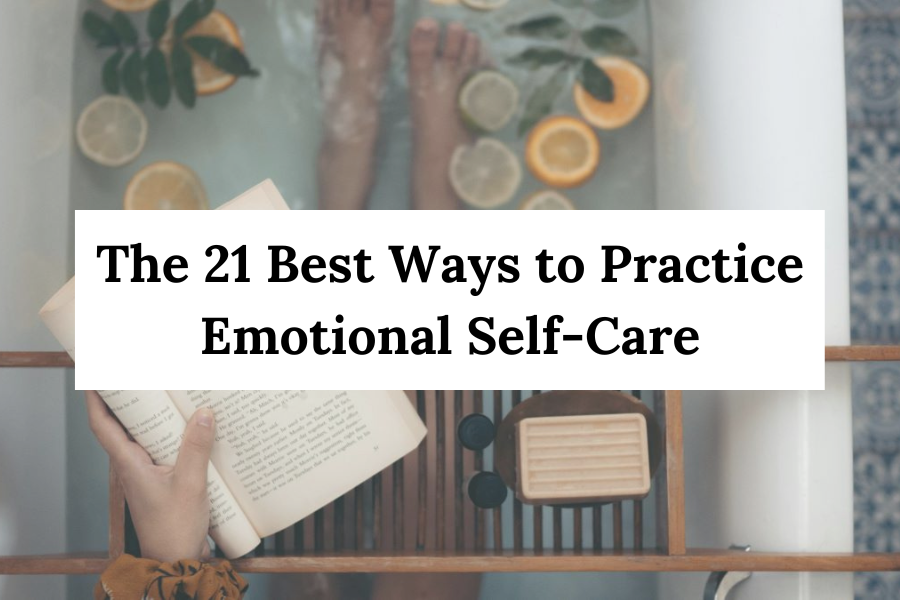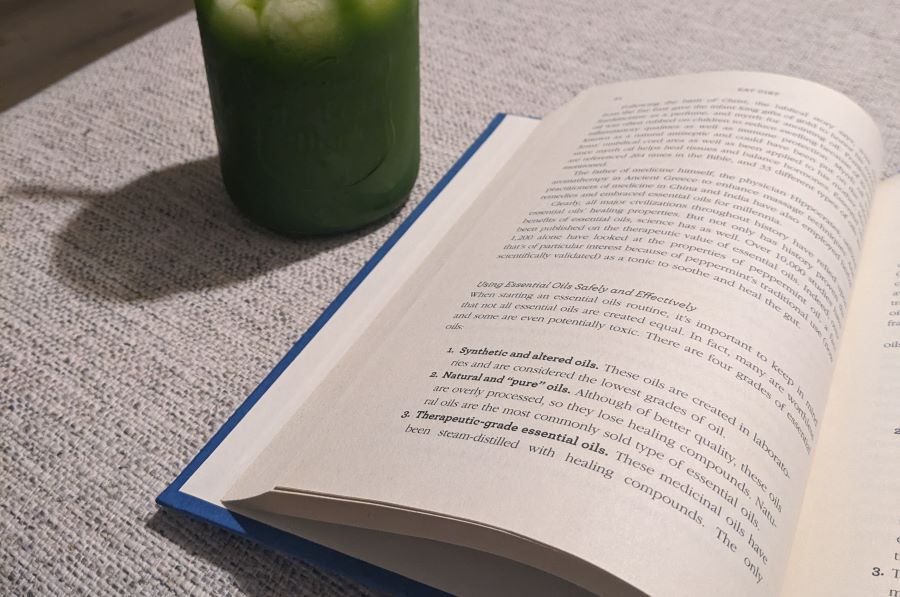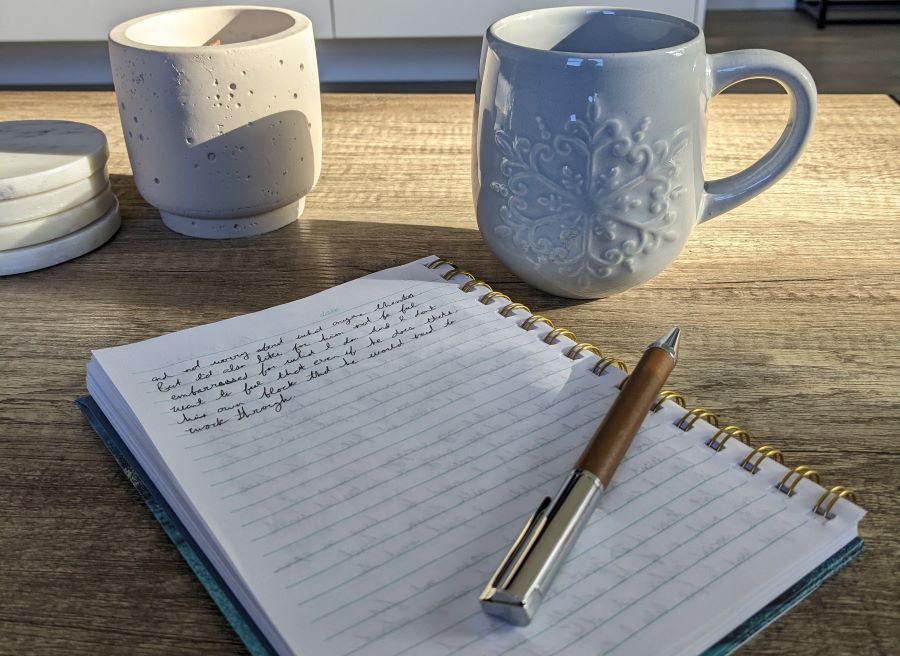This post is about the best emotional self-care practices that you can do to improve your well-being and have a healthier mindset.
This post is for informational and educational purposes only. This post should not be taken as medical advice or used as a substitute for such. We do our best to present the best and most accurate information, however, we are not a licensed medical professional. All information on this Site is from personal experience or opinion, and we are not liable for risk and issues associated with using or acting upon the information on this Site. See Terms & Conditions for further information.

In today’s world, we have a lot on our minds, all the time.
These days we live in such a fast-paced society, we’re constantly busy and stressed out. We rarely take time to prioritize our mental health let alone our emotional health.
Most of us are worried about something almost 100% of the time. Whether it is a problem at work or something at home we need to take care of.
Our minds are always occupied.
That is why emotional self-care is so important. If you aren’t prioritizing taking care of your emotional well-being, then it can potentially leak into other areas of your life and cause larger problems.
This post is all about the 21 best ways to practice emotional self-care to improve your well-being.
What is Emotional Self-Care
There is a lot more knowledge about our mental health and the state of our minds now compared to even a few years ago.
Which is amazing!
Our entire lives we spend inside our minds. For a long time, it wasn’t being recognized as something we needed to take care of. Now people are starting to see the importance of it.
So, what exactly is emotional self-care?
Emotional self-care is the act of processing and healing our feelings and emotions.
Now some people may not think this is very important, but it is.
Our emotions can run our lives if we don’t have a grasp on them and don’t know how to control or work with them.
I’ve known many instances where people allow their anger to get the best of them. As a result, will get into fights, verbal and physical all because of the uncontrollable emotion that took over.
Not being able to control our emotions can affect the relationships we have with people in our lives.
It can affect us at work if we lash out at our boss, or if we are the boss, lash out at our employees.
It can affect us at home with our families if we can’t express how we feel so instead we turn to yelling, or completely shutting down and becoming silent.
Understanding how and why you’re feeling a certain way can help you navigate your day-to-day emotions much easier.

Importance of Emotional Self-care
The main reason emotional self-care is so important is because most people don’t practice it at all!
That said, we need to practice emotional self-care because our emotions can largely affect the quality of our lives.
When you practice emotional self-care you can better control your reaction, or non-reaction in this case to situations that arise during your day.
Being able to control your reaction will allow you to take a backseat and assess how the situation is making you feel.
You then can determine if you need to react in the way you were originally going to, or if there is another way the problem can be resolved.
Most of the time we overreact to situations. Especially situations that upset us, or when things don’t go as planned.
If you have better knowledge about your emotions, you can change the way you react to issues in your life and as a result, change the way you feel about those issues.
And the way we feel about our life greatly affects the quality of life that we have.
That is why being able to process your emotions can help you have a healthier mindset, which will lead to a healthier and happier overall life.

Ways to Practice Emotional Self-Care
1. Therapy
Most of us have a lot on our minds and sometimes it can help to talk with someone like a therapist who can help you organize your thoughts and feelings.
They can potentially assist you in making sense of those thoughts and what they may mean. They can also help you understand what aspects of your life you may need to work on.
2. Prayers or Affirmations
Saying or writing down prayers or affirmations is an amazing way to practice emotional self-care. They give us something to believe in.
Prayers and affirmations are made to help you create a positive mindset and shift you into a state of gratitude. Because of this, they are wonderful for assisting in creating a healthier emotional well-being.
3. Speak Kindly to Yourself
You speak to yourself more than anyone else in your life, so what you say to yourself matters.
If you’re constantly speaking negatively towards yourself, you aren’t going to feel very good.
If you start to practice more positive self-talk, you’ll notice how much better to start to see yourself and feel about yourself.

4. Ask for Help When Needed
I know a lot of people who refuse to ask for help when they are struggling with something.
But you can!
If something heavy is weighing on you, you have the right to ask for help.
The worst thing that will happen is the person can’t help you. The best thing is they can help, and you won’t be alone anymore in carrying that weight on your shoulders.
Other people are wonderful for supporting you in overcoming challenges you may be facing.
5. Read Self-help Books
Self-help books or growth mindset books, are wonderful to help improve your emotional well-being.
A lot of books provide great tips on how to practice staying true to yourself while also focusing on bettering your physical, mental, and emotional health.
6. Journaling
Journaling is another way to practice emotional self-care. You can journal about your day, any struggles you had, or how you are feeling about a specific situation.
It’s a great place to let your feelings out. It’s like a giant ocean you can pour everything into.
Here are 23 Powerful Mindfulness Journal Prompts for Self-Discovery if you need some guidance to start journaling.

7. Setting Boundaries
When it comes to relationships with others sometimes we unknowingly take on the emotions of the other person.
If you’re with someone who is expressing how angry they are at a situation or person and you also now start to reflect and feel that same anger, that anger can spread into the rest of your day.
Now you’re allowing another person to affect your emotions when they weren’t your emotions to begin with.
Setting boundaries and being conscious that if someone else is feeling upset or angry, you don’t have to feel that same emotion.
You can be there for the person, and help them move through those emotions without allowing yourself to also feel those same emotions.
8. Saying No
You don’t always have to agree to everything people say or ask you do to. If it doesn’t feel right to you then you have every right to say no and to not feel guilty about it.
If you’re invited to go out but would rather have a night in, that is perfectly fine. Tell the person you aren’t up for it tonight but maybe next time.
You deserve to use your time as you feel most fit.
9. Heal Your Inner Child
A lot of the experiences we had as children helped to mold us into the people we are today.
Sometimes those experiences turned into wonderful qualities we now have. Other times something may have happened that led us to create some not-so-good habits.
These are the things you can dive into and see maybe when and why these habits started. It can help you understand more about why you do certain things as an adult.

10. Join a Support Group
A support group is another great way to practice emotional self-care.
It allows you to share how you feel with other people who are also expressing their feelings.
It gives you an environment to feel comfortable to talk openly about your emotions, while not feeling judged by other people since they are also there for similar reasons.
11. Get Rid of Toxic People
If you have people in your life who aren’t adding to it, but instead creating negativity, you don’t have to be around those people.
You don’t have to stay connected with anyone if they are causing you pain.
The choice is yours to not have someone in your life if they make you feel bad for any reason.
12. Spend Less Time On Social Media
Social media can damage the way we see ourselves.
We see all the highlight reels of other people’s lives and then in turn think our lives are terrible in comparison.
The truth is their life is probably just like yours. The difference is they are cutting and editing to only show the good parts.
Whereas you see all the parts of your own life in full. If everyone showed their whole lives, we’d all probably feel a lot better about ourselves.
13. Stop Looking at Negativity Online
Unfollow people who don’t make you feel good, and don’t look at profiles that create negativity in your mind.
There is no reason to have that. Nothing good comes from it, and it’s a simple fix.
Stop reading about other people’s arguments or rants. That can subconsciously put their negative feelings into your mind. Making it become your problem which can negatively impact your day.
You create your environment so start creating one that brings you up, not tears you down.

14. Express Your Feelings More
This can mean expressing your feelings more to the people in your life so they can understand you better.
It can also mean expressing your feelings to yourself. Allowing yourself to feel what you are feeling fully.
Sometimes it can help to yell, or physically move, for example shaking to allow the feeling/emotion to fully open.
Even journaling like I mentioned above is a great way to express your feelings without having to share them with others if you don’t want to.
15. Stop Apologizing
Stop apologizing to everyone when it’s not necessary. This is another great emotional self-care tip.
I’m Canadian and I know the joke is that Canadians say “sorry” for everything, which isn’t entirely wrong. We do say sorry a lot.
But this needs to stop when it’s not necessary. It can inadvertently make you feel like you are doing something wrong that you need to apologize for. When you actually didn’t do anything wrong.
Stop making it a habit of apologizing when there is nothing to apologize for.
16. Spend Time Doing Hobbies
If you already have hobbies you enjoy doing then start prioritizing time for them. If you don’t have a hobby then try out some you think you may enjoy.
Giving yourself time to enjoy life through activities that bring you happiness will help your mental and emotional state. It allows you to open up and feel freer to express yourself.

17. Letting Go
Letting go can be very hard for most people.
I feel like as humans we tend to hold onto things for a long time, and sometimes holding onto these things can have negative effects.
We hold onto grudges if someone said something that hurt or upset us.
Maybe we feel we said something wrong in a conversation and now we can’t stop thinking about it.
A lot of the things we hold onto aren’t doing us any good and are causing us emotional harm.
They can make us feel worse because we’re holding onto those negative feelings.
If someone says something that upsets you, you can either confront them and tell them how you feel, or move on and not allow it to affect you.
Either way, you should practice letting go and releasing the anger or hurt you have inside from situations that upset you.
18. Self-Forgiveness
No one is perfect, and everyone has done things they probably aren’t proud of.
We all make mistakes, some big, some small, and as a result, we usually have regrets and feel guilty about those past actions.
We need to learn to move past and forgive ourselves for things we can no longer change.
The past is in the past. We can’t change it now.
All you can do is move on and do better in the future.
Let’s start practicing self-forgiveness because we all deserve forgiveness.
19. Acknowledge Your Emotions
You can start practicing this right away. Take a moment right now and check in with how this post is making you feel.
Are you feeling motivated to practice these emotional self-care acts? Are you feeling resistant because you know you struggle with a lot of these practices?
All these feelings and emotions are you experiencing are valid, and you are allowed to feel them.
Nothing you feel is wrong because it’s how you feel.
Practicing being more aware of the emotions you are feeling and why you might be feeling them can help you have more control of them.
20. Practice Meditation
Meditation has been around for thousands of years and has been practiced in the search for mindfulness.
It can help us regulate our nervous system and help us to practice mindfulness throughout our daily lives.
Meditation is a great emotional self-care practice because you are focusing on you. How you feel about yourself, your life, and your thoughts.
It allows you to focus on your feelings and emotions towards your life.
It can give us a better understanding of who we are, which can support us in living in alignment with our truest selves.

21. Less News Exposure
I’m not sure if you’ve noticed, but most news is extremely negative.
Constantly exposing ourselves to such negativity every day isn’t good for our mental or emotional well-being.
How can you expect to be a positive person and have a good lookout on life when you’re consuming so much negativity?
There are other ways to stay informed of the world’s happenings that won’t make you feel so terrible about your life.
Now that we’ve gone over all the ways you can practice emotional self-care I encourage you to take action and try one of these today.
You don’t have to get overwhelmed and start implementing them all today.
Even if you try one or two of these, they will help you greatly in creating a healthier emotional state.
These emotional self-care practices are here to allow more peace within your mind and enable you to better control your emotions regularly.




